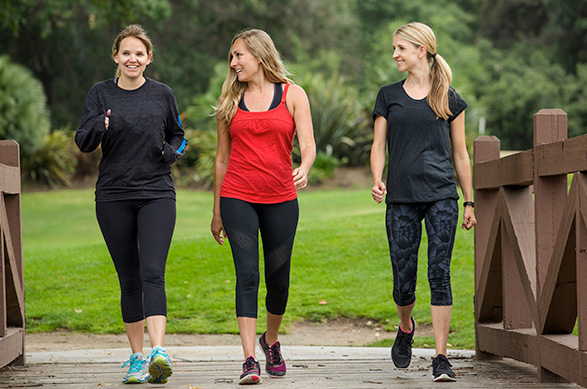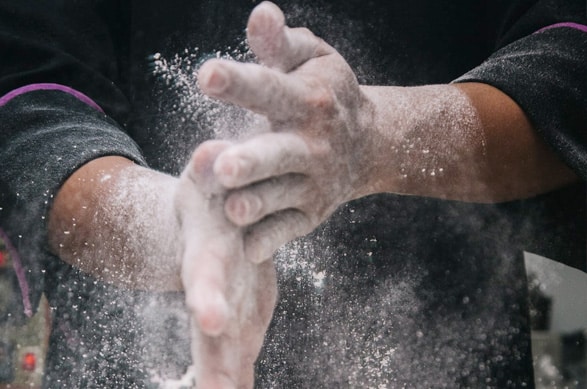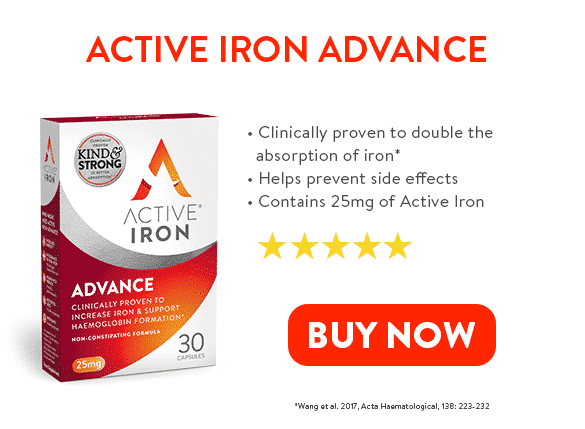Coeliac disease is caused by a reaction to gluten and is a lifelong autoimmune disease. Gluten is a protein found in wheat, barley and rye. When someone with coeliac disease eats gluten, their immune system reacts by damaging the lining of the small intestine. Approximately 1 in 100 have the condition and symptoms include diarrhoea, bloating, wind, nausea, constipation, tiredness, sudden weight loss or gain, hair loss and anaemia. Once a person is diagnosed with Coeliac Disease, they must follow a gluten-free diet for life. However, only a quarter of people who have the disease have been diagnosed.
Iron Deficiency is common among people who have undiagnosed Coeliac Diseases as the body can’t absorb iron very well from food. In untreated coeliac disease, the lining of the gut is damaged by eating gluten. Damage to the gut lining can reduce the absorption of nutrients such as iron.
What is Iron Deficiency?
Iron deficiency simply means that the iron stores in your body are low. You can have low iron without being anaemic. Anaemia is the end stage of having low iron where there is a reduction in red blood cells or haemoglobin. Iron is essential for normal body function and to make haemoglobin.
What are the signs of Iron Deficiency?
The common signs of iron deficiency include: general fatigue, weakness, pale skin, shortness of breath, dizziness, strange cravings to eat items that aren’t food, such as dirt, ice, or clay, a tingling or crawling feeling in the legs, tongue swelling or soreness, cold hands and feet fast or irregular heartbeat, brittle nails and headaches.

Iron and your diet
A Coeliac will need to consume the same amount of iron as anyone else and should look to their diet to ensure they are meeting their iron needs.
Iron is known as an ‘essential’ mineral. Necessary for life, iron also gains this distinction because we cannot make iron in our body on our own, and thus require a regular supply via our diet.
There are two types of iron, and it’s important to understand their differences to maintain proper iron levels in your body.
Haem iron, which is also known as organic iron, is found in meat and other animal proteins and is the most readily absorbed. Depending on the body’s needs— uptake increases when our stores are low, and falls when we have adequate supplies — between 15 % to 35 % is taken up. Haem iron also enhances the bioavailability of non-haem iron, which can be found in plant-based sources. Bioavailability is defined as the proportion of a drug or other substance which enters the circulation when introduced into the body, and is able to have an active effect.
Active Iron is tough on tiredness
Non-haem iron, or inorganic iron, is found in vegetables and other plant sources, and is not as well absorbed as the haem iron in meat. Other foods, and factors such as acidity, can also affect uptake. As a result, the amount we absorb can range from as little as 2% to 20%. Most supplements contain this poorly absorbed inorganic iron, which can be identified by the words ‘ferrous’ or ‘ferric’.
The varying bioavailability of iron means that foods which appear to be good sources are not always as useful as they appear. For instance, a 100g steak has around 3.2mg of iron and the same amount of raw spinach has 2.7mg— but the haem iron in the steak is up to six times more bioavailable than the non-haem iron in the spinach.

What to do if low in iron?
Someone who has recently been diagnosed Coeliac may find themselves low in iron and may be recommended by their Health Care Professional to take an iron supplement. Present modes of iron supplementation and fortification are not without problems, though. Typical supplements are limited by poor absorption, resulting in widespread use of high-dose formulations. These are poorly tolerated, contributing to side effects such as nausea, constipation, stomach pain and poor compliance.
Active Iron – Kind & Strong
Active Iron has clinically proven to increase iron levels by 94%, while still being gentle enough to take on an empty stomach, and helping to increase iron levels and decrease tiredness and fatigue*. Active Iron is also safe to take during pregnancy and breast feeding, and is suitable for vegetarians and those with Coeliac Disease.
We are so confident in Active Iron that we are delighted to offer a 30-Day Money Back Guarantee when you buy a 30 Pack online with us »
*Ledwidge et al. Data on file.


